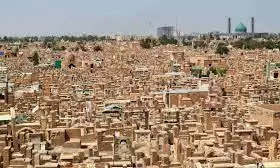
UNESCO acknowledges Iraq's Wadi Al-Salam as world's largest cemetery
text_fieldsUNESCO has recognised Wadi Al-Salam, situated in the holy city of Najaf, Iraq, as the largest cemetery globally, encompassing more than six million burial sites.
Spanning an estimated area of 917 hectares, equivalent to over 1,700 football fields, this burial ground holds immense historical, cultural, and religious significance.
Referred to as the "Valley of Peace," Wadi Al-Salam has become the final resting place for numerous prominent figures, including prophets, scientists, royals, and revered personalities. It is a site that bears witness to ancient traditions dating back to eras predating the Middle Ages.
From an aerial view, the cemetery resembles a cityscape, with graves closely packed, resembling clustered structures, drawing visits from Muslims worldwide. Notably, it holds the tomb of Imam Ali Ibn Abi Talib, the son-in-law of Prophet Mohammad, contributing to its universal religious significance.
Aside from housing revered figures, Wadi Al-Salam also embodies a unique cultural tradition, reflecting a distinctive method of land utilisation, as highlighted by UNESCO. It stands as an essential pilgrimage site for Shia Muslims globally, witnessing an annual burial of approximately 50,000 individuals.
The burial ground's significance extends beyond its religious and cultural value, featuring a blend of historical eras, including the resting places of leaders from Al-Hira, Al-Sassani era, and various states such as Fatimia, Al-Buwayhyia, Saffawayia, Qajar, and Jalairiyah.
Despite its historical and cultural significance, the cemetery lacks navigational aids, making it a challenging labyrinth to navigate through. Moreover, reports suggest that the cost of burial and tombstones in Wadi Al-Salam can range from $100 to $200.
UNESCO's recognition adds another layer of significance to Wadi Al-Salam, supplementing its listing in the Guinness Book of World Records as the world's largest burial ground. This acknowledgment underlines its pivotal role in preserving historical heritage and religious tradition, marking it as a site of universal cultural importance.























